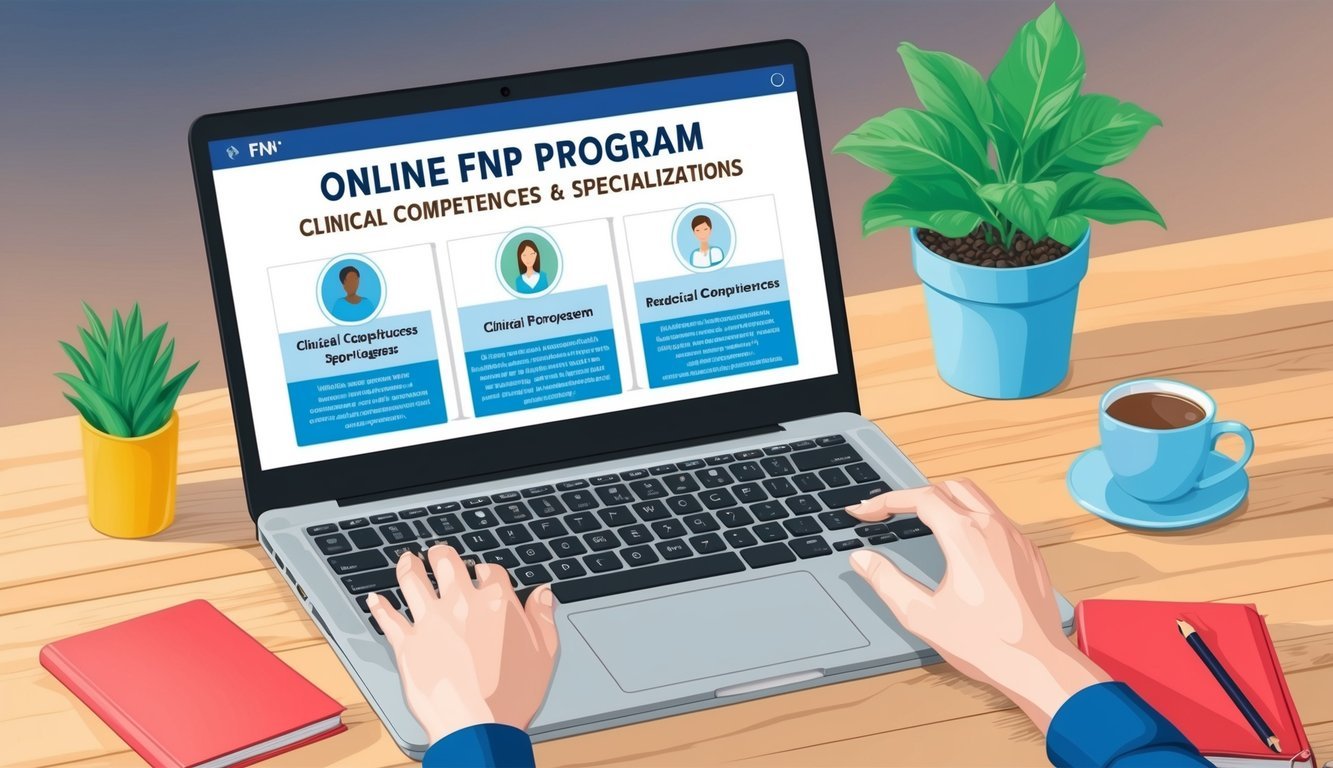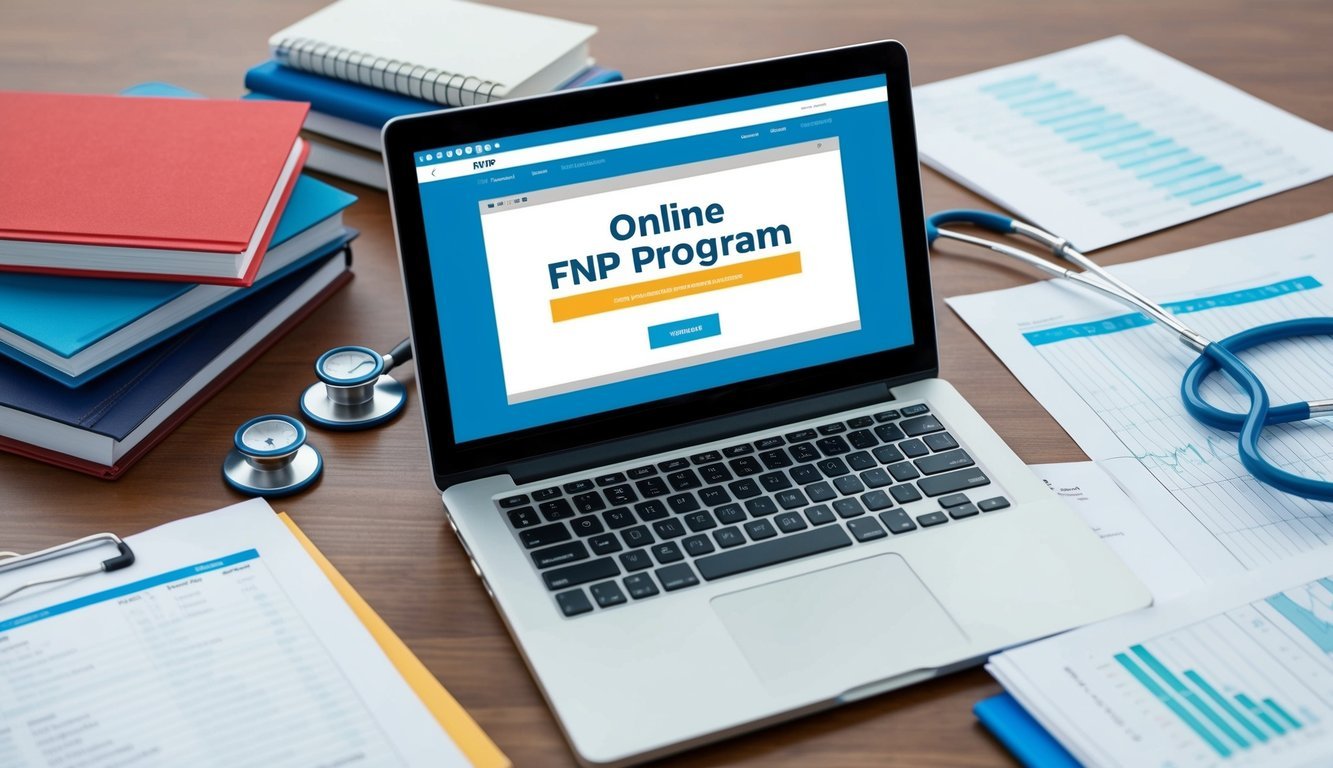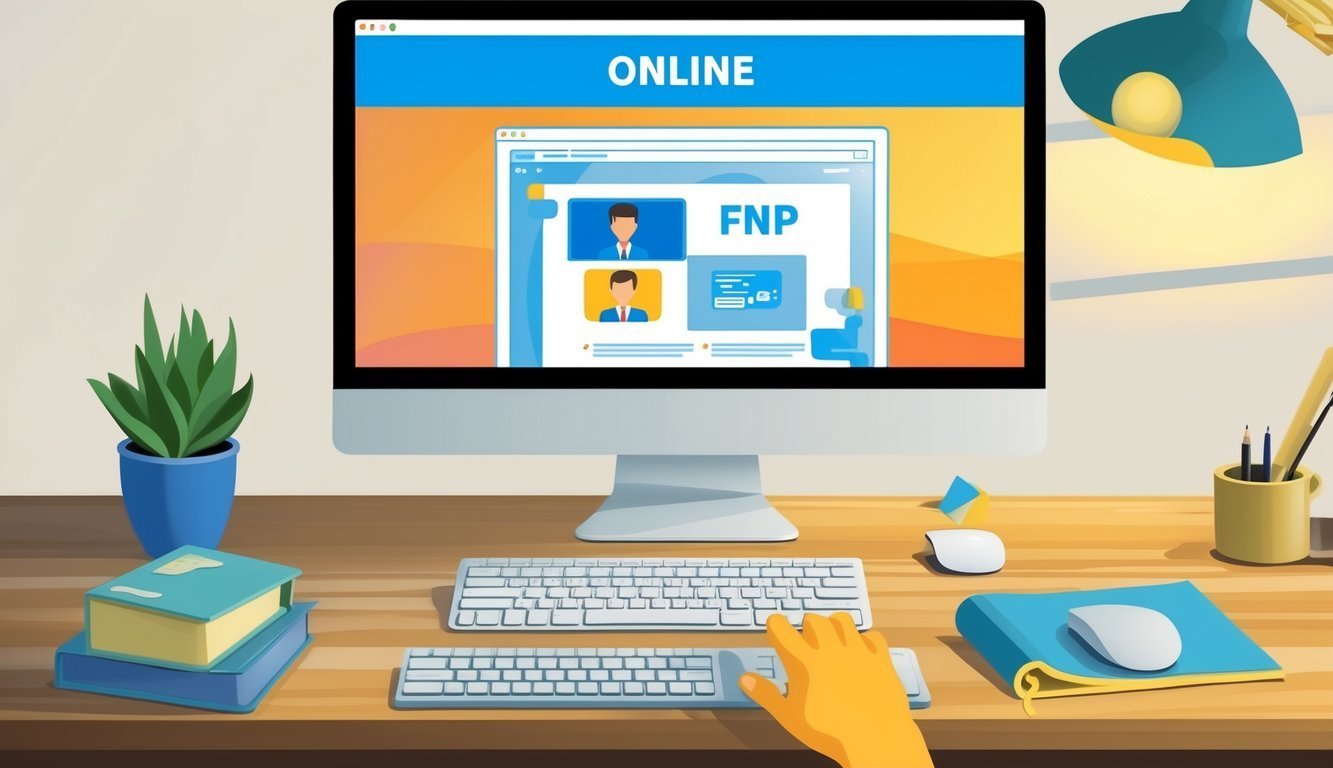As a nurse looking to advance your career, you can pursue a Family Nurse Practitioner (FNP) program online. These programs offer a flexible pathway to becoming a Family Nurse Practitioner. You can build on your existing nursing skills while pursuing advanced practice and patient care roles.
You can expect a combination of online nursing classes and in-person clinical experiences, ensuring you gain both theoretical knowledge and practical skills.
Many reputable institutions, such as WGU and UConn, offer comprehensive online options tailored to your busy schedule.
Completing an FNP program online not only enhances your qualifications but also prepares you for the high demand for Family Nurse Practitioners in the healthcare field.
By choosing an online program, you can study at your own pace while engaging in essential clinical rotations.
This balance helps you manage your work-life commitments while pursuing your ambition to become an FNP.
Exploring the Foundation of FNP Programs
Understanding the core aspects of Family Nurse Practitioner (FNP) programs is essential for prospective students.
These programs play a crucial role in nursing education and prepare you for advanced practice as an APRN.
What is a Family Nurse Practitioner?
A Family Nurse Practitioner (FNP) is a specialized nurse practitioner who provides comprehensive healthcare across all ages.
FNPs hold advanced degrees and are skilled in diagnosing and treating various health conditions.
Unlike traditional nurses, they are trained to perform physical examinations, interpret diagnostic tests, and initiate treatment plans.
FNPs often work in diverse settings, including clinics, hospitals, and private practices.
They focus on health promotion, disease prevention, and patient education, making them vital in primary care.
Their extensive training includes a deeper understanding of family dynamics, which allows them to deliver personalized care.
The Online FNP Program Experience
Online FNP programs offer flexibility and convenience, allowing you to balance your studies with work and personal commitments.
These programs typically combine theoretical coursework with practical experiences.
You can access lectures, engage in discussions, and complete assignments from anywhere.
A typical online FNP program includes virtual simulations and clinical placements, which are crucial for hands-on learning.
Institutions like Maryville University enable you to complete your degree entirely online, which can be beneficial if you have family or job responsibilities.
Education Pathways: BSN to MSN FNP Programs
If you hold a Bachelor of Science in Nursing (BSN), you can pursue a Master of Science in Nursing (MSN) FNP program.
This pathway is designed for registered nurses seeking to advance their careers.
These programs cover essential topics such as pathophysiology, pharmacology, and advanced health assessments.
Courses often include both online coursework and in-person clinical hours.
Here’s a comparison of education pathways:
| Pathway | Duration | Degree Earned | Key Focus |
|---|---|---|---|
| BSN to MSN FNP | 2-3 years | MSN | Advanced clinical practice, leadership |
| Direct Entry MSN | 3-4 years | MSN | Nursing fundamentals and advanced practice |
By choosing the right pathway, you can advance your career as a Family Nurse Practitioner, fulfilling a critical role in healthcare.
Accreditation and Academic Excellence
Accreditation plays a crucial role in ensuring the quality and integrity of online Family Nurse Practitioner (FNP) programs.
Understanding the organizations involved and identifying prominent accredited programs can guide you in selecting a reputable online education pathway.
Accrediting Bodies and Standards
In the United States, the Commission on Collegiate Nursing Education (CCNE) is one of the primary accrediting bodies for nursing programs.
Their rigorous standards evaluate programs based on criteria such as curriculum quality, faculty qualifications, and student outcomes.
Accreditation ensures that you receive a quality education that meets regulatory standards.
Graduating from an accredited program is often a requirement for licensure and can enhance your employment prospects.
When researching programs, always look for CCNE accreditation or recognition from other reputable organizations.
Prominent Accredited Online FNP Programs
Several institutions stand out for their accredited online FNP programs.
Below is a list of notable universities offering these programs:
| University | Accreditation | Key Features |
|---|---|---|
| Duke University | CCNE accredited | Emphasizes leadership and clinical excellence. Offers diverse clinical placement options. |
| Georgetown University | CCNE accredited | Known for community health focus; offers a streamlined online curriculum. |
| Duquesne University | CCNE accredited | Offers flexible scheduling and strong faculty support. |
| George Washington University | CCNE accredited | Highly ranked program with a strong research component. |
Enrolling in any of these accredited programs not only assures you of quality education but also prepares you for a successful career in nursing.
Clinical Competencies and Specializations

In an online Family Nurse Practitioner (FNP) program, developing clinical competencies is crucial for effective patient care.
You will focus on advanced pathophysiology, pharmacology, and health assessment to enhance your understanding of patient needs and treatment options.
Specializations offer opportunities to refine your skills in various areas of primary care, emphasizing health promotion and disease prevention.
Advanced Pathophysiology, Pharmacology, and Health Assessment
Advanced Pathophysiology provides the foundation for understanding disease mechanisms.
You will study how diseases affect various body systems, which is essential for accurate diagnosis and treatment planning.
Pharmacology is equally critical.
You’ll learn about medication classifications, dosages, and interactions.
This knowledge helps you make informed decisions regarding patient medication management.
Health assessment skills are vital for collecting and analyzing patient data.
Mastering these skills improves your ability to develop comprehensive care plans tailored to individual patient needs, ultimately leading to better health outcomes.
Developing Clinical Skills and Expertise
Your clinical skills will further solidify during clinical rotations, which allow you to apply theoretical knowledge in real-world settings.
These rotations usually require a significant number of clinical hours, ensuring you gain hands-on experience.
During these experiences, you will encounter diverse patient populations, allowing you to practice and develop advanced practice nursing skills.
Key skills include thorough patient assessments, effective communication, and the ability to implement health promotion and disease prevention strategies.
As you engage with patients, you’ll build expertise that is essential for safeguarding public health.
Participating in these clinical experiences enhances your confidence and competency as a Family Nurse Practitioner, preparing you for a successful career in healthcare.
Online Learning and Professional Advancement
Pursuing an online Family Nurse Practitioner (FNP) program offers flexibility that can significantly enhance your nursing career.
Balancing professional responsibilities with education is crucial, and online learning facilitates this integration.
Additionally, interactive learning modules provide immersive experiences to deepen your knowledge and skills.
Balancing Work and Study
Navigating an online FNP program requires careful planning to balance your career and studies.
Many programs allow asynchronous learning, enabling you to engage with course material at your convenience.
This flexibility allows you to maintain your professional responsibilities while working towards becoming an Advanced Practice Registered Nurse.
Tips for managing your schedule include:
- Creating a study timetable: Allocate specific times each week for coursework.
- Setting clear priorities: Determine which tasks require immediate attention and which can wait.
- Utilizing support resources: Seek guidance from your employers or academic advisors.
Finding a study environment free from distractions will also help you effectively manage time.
Interactive Online Learning Modules
Interactive modules in online FNP programs enhance your learning experience through practical engagement.
These modules often include simulated clinical scenarios that mimic real-life situations you might encounter as a nurse.
This immersive experience prepares you for actual patient interactions.
Key features you will encounter are:
- Video presentations: These offer visual and auditory learning aids.
- Discussion forums: Engage with peers to discuss challenges and share insights.
- Field experience requirements: Many programs incorporate an immersion experience, connecting you with clinical practice in your community.
The blend of theory and practice within interactive modules fosters deeper understanding and competency in your nursing practice, positioning you effectively for career advancement.
For more information about the structure and benefits of online FNP programs, visit NursingProcess.org.
Certification and Licensure Pathways

Understanding the certification and licensure pathways is crucial for your career as a Family Nurse Practitioner (FNP).
This involves passing certification examinations and meeting state-specific licensure requirements.
FNP Certification Examinations
To practice as a Family Nurse Practitioner, you must pass a certification examination.
The two primary certifying bodies are the American Nurses Credentialing Center (ANCC) and the American Academy of Nurse Practitioners (AANP).
You can choose between the following exams:
| Certifying Body | Exam Name | Eligibility Requirements |
|---|---|---|
| ANCC | FNP Certification Examination | Must hold an MSN or DNP and complete FNP program requirements |
| AANP | Nurse Practitioner Board Certification | Requires a graduate degree in nursing and completion of FNP program |
Both certifications are recognized nationally and have different focus areas, so it’s essential to select the one that aligns best with your career goals.
Licensure and State Requirements
After you pass your certification exam, you must obtain licensure to practice in your state.
Each state has unique requirements.
These often include:
- A valid RN licensure
- Proof of your certification
- Submission of a detailed application
- Payment of applicable fees
Some states may also require additional coursework or examinations.
Make sure to verify your state’s specific requirements through your state board of nursing or visit resources like the NCSBN for guidance.
Also, be aware of renewal requirements, including continuing education to maintain your licensure and certifications.

